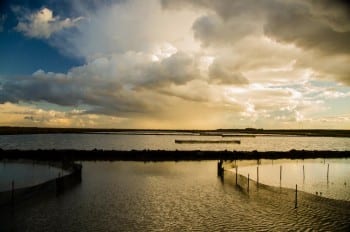Nigiri Project Mixes Salmon and Rice Fields for Fifth Year on Floodplain
Experiment Points to Water Policy Solutions to Support Both Salmon Recovery and Agriculture

Juvenile salmon feast on bugs in enclosed areas of the Yolo Bypass during a 2014 experiment in a flooded rice field. The experiment in 2016 is in its fifth year. Photo by Carson Jeffries, UC Davis
From the Daily Democrat
An annual experiment to “plant” salmon in the rice fields of Knaggs Ranch fields aims to better explain how floodplains support strong salmon populations.
Dubbed the “Nigiri Project” for its sushi-like marriage of fish and rice, the research is a collaborative project among the UC Davis Center for Watershed Sciences, the California Department of Water Resources and nonprofit organization California Trout.
This year, for the first time, the agricultural floodplain habitat experiment will compare food web productivity and fish growth in three different kinds of river habitat.
For the course of the experiment, a group of juvenile Chinook salmon will be held in underwater pens on flooded rice fields, as in years past; a second group will be held in pens floating in an agricultural canal; and a third group will be held in floating pens nearby in the Sacramento River. The experiment began on Feb. 19, and the fish will be released after about four weeks.
A tour of the facility and update on the effort is taking place Friday.
To read the full article in the Daily Democrat, click here.




